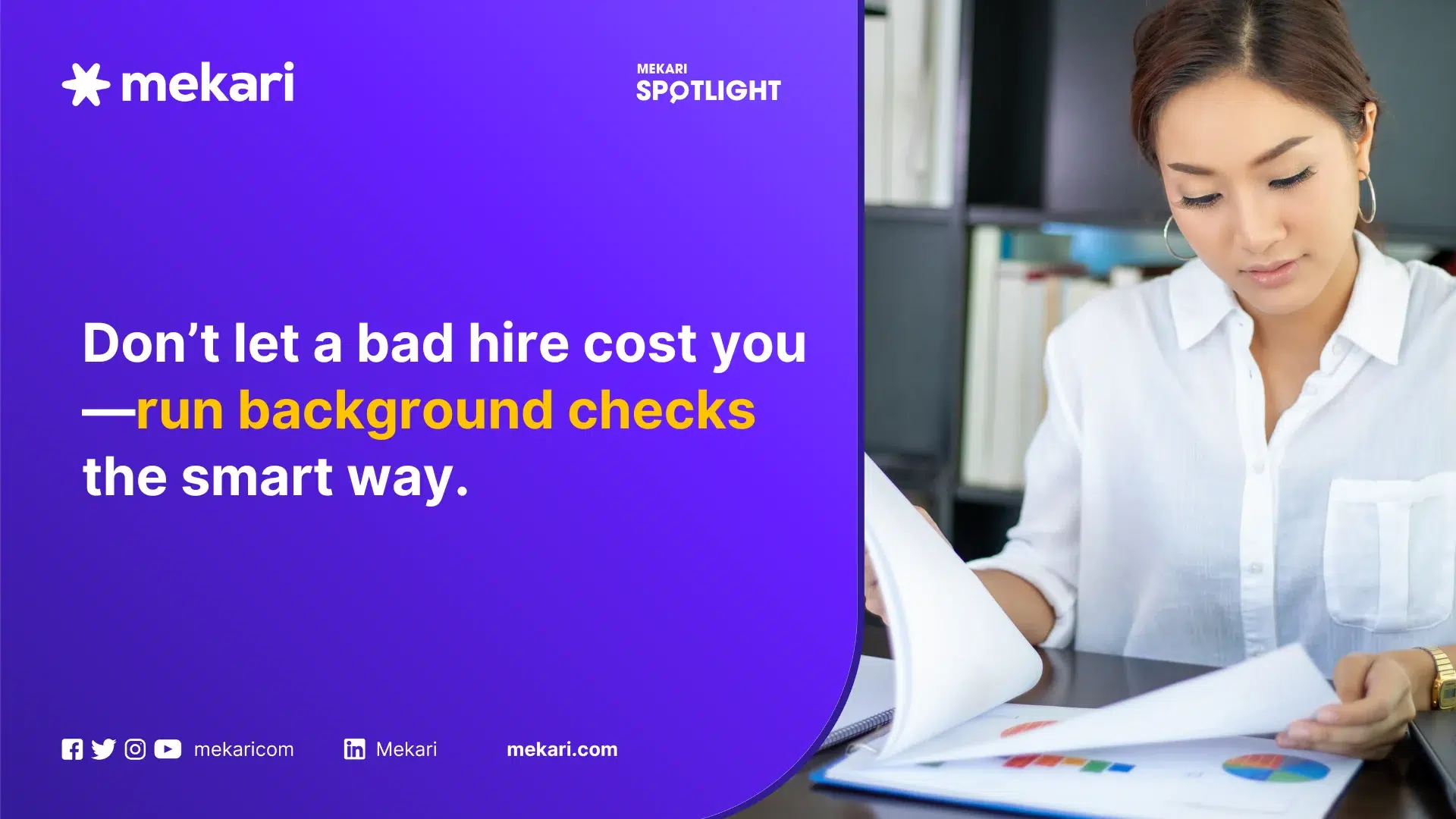Mekari Insight
- In Indonesia’s fast-paced job market, background checks are no longer optional. Skipping this step can result in bad hires, reputational damage, and unsafe work environments.
- Comprehensive background checks help build trust from day one. Verifying identity, work history, education, criminal records, and even social media presence ensures you’re hiring qualified, reliable people.
- Using a platform like Mekari Talenta streamlines the entire process of employee background checks. From automated checks to seamless onboarding, Mekari Talenta helps HR teams run faster, more compliant, and more organized hiring workflows.
Employee background check is a process used by employers to verify a candidate’s identity, education, work history, criminal record, and other key information before officially hiring them.
In Indonesia’s fast-paced job market, skipping this step can lead to:
- Bad hires that hurt productivity and reputation
- Fake credentials slipping through the cracks
- Unsafe work environments if past misconduct goes unchecked
By making background checks part of your recruitment process — especially with the help of the right solution — you reduce risks and build a more trustworthy team from day one.
Read more to find out the best employee background check services in Indonesia.
Why employee background checks matter
Incorporating background checks into your hiring process is building a reliable, trustworthy team from the ground up.
Here’s why they matter:
- Prevent bad hires: Thorough background checks help verify a candidate’s identity, qualifications, and past employment, reducing the risk of hiring unqualified individuals.
- Ensure workplace safety: By identifying potential red flags, such as a history of violence or fraud, background checks contribute to a safer work environment.
- Protect company reputation: Hiring someone with a problematic background can lead to incidents that damage your brand’s image. Background checks help mitigate this risk.
- Ensure compliance with regulations: Certain industries require background checks to meet legal standards, especially for roles involving sensitive information or vulnerable populations.
- Build trust within the team: Knowing that all employees have been properly vetted fosters a sense of security and trust among staff.
Read more: Top 10 HR SaaS Companies by Function to Simplify HR WorkloadKey components of effective background checks
A thorough background check is essential for ensuring that potential hires are qualified, trustworthy, and a good fit for your organization. Here are the key components:
1. Identity verification
This step confirms that the candidate is who they claim to be. It involves checking official documents and databases to validate personal details like full name, date of birth, and address history.
This helps prevent identity fraud and ensures the accuracy of the information provided.
2. Employment history validation
Verifying a candidate’s work history ensures that their experience aligns with what’s listed on their resume.
This includes confirming previous job titles, durations of employment, and reasons for leaving. It helps detect any discrepancies or exaggerations in the candidate’s employment record.
3. Educational qualifications verification
This process confirms the authenticity of academic credentials claimed by the candidate. It involves verifying degrees, certifications, and institutions attended.
This is crucial for positions that require specific educational backgrounds.
4. Criminal record checks

Conducting criminal background checks helps identify any past convictions or pending charges that may be relevant to the job role.
This ensures workplace safety and compliance with industry regulations.
5. Reference checks
Contacting previous employers or colleagues provides insights into the candidate’s work ethic, reliability, and performance. These checks can reveal information not apparent from resumes or interviews.
6. Social media screening

Reviewing a candidate’s public social media profiles can offer additional context about their behavior and professionalism. It helps assess whether their online presence aligns with company values.
How to conduct an employee background check step-by-step
Conducting a thorough background check is crucial for making informed hiring decisions. Here’s a detailed guide to help you navigate the process:
1. Develop a background check policy
Before initiating any background checks, establish a clear policy to ensure consistency and compliance.
- Define the scope. Determine which positions require background checks and what types of checks are necessary (e.g., criminal, educational, employment).
- Establish procedures. Outline the steps for conducting checks, including timelines and responsible parties.
- Ensure consistency. Apply the policy uniformly to all candidates to avoid discrimination claims.
2. Understand legal requirements
It’s essential to be aware of and comply with all relevant laws and regulations.
- Obtain consent. Secure written permission from candidates before initiating any background checks.
- Comply with regulations. Familiarize yourself with local laws governing background checks to ensure compliance.
3. Choose your background check approach
Decide whether to conduct checks internally or hire a reputable background screening company.
- In-house vs. third-party. Evaluate the pros and cons of conducting checks internally versus outsourcing to a professional service.(
- Select reliable sources. Use trustworthy databases and verification methods to gather accurate information.
4. Collect necessary information
Gather all required information to initiate the background check process.
- Gather candidate details. Obtain relevant information such as full name, date of birth, and previous addresses.
- Request supporting documents. Ask for copies of degrees, certifications, and identification as needed.
5. Conduct the background check
Proceed with the background check by verifying the collected information.
- Verify employment history. Confirm previous job titles, durations, and reasons for leaving.
- Check educational qualifications. Validate degrees and certifications with issuing institutions.
- Review criminal records. Search for any criminal history that may impact job performance.
- Assess credit history. For financial roles, evaluate credit reports to gauge financial responsibility.
- Conduct reference checks. Speak with former supervisors or colleagues to gain insights into the candidate’s work ethic and behavior.
- Perform social media screening. Review public social media profiles to assess the candidate’s online behavior and ensure it aligns with company values.
6. Analyze the results
Carefully review the findings to make informed hiring decisions.
- Compare the provided information. Identify any discrepancies between the background check findings and the candidate’s resume or interview responses.
- Evaluate relevance. Consider the nature and severity of any issues found, and how they relate to the job responsibilities.
- Make informed decisions. Use the gathered information to determine the candidate’s suitability for the role.
7. Communicate with the candidate
Maintain transparency by discussing the results with the candidate.
- Provide feedback. Inform the candidate of the background check results, especially if any concerns arise.
- Allow for clarification. Give the candidate an opportunity to explain or dispute any findings before making a final decision.
8. Maintain records securely
Ensure all background check records are stored securely and in compliance with data protection laws.
- Store information safely. Keep background check reports and related documents in a secure location, accessible only to authorized personnel.
- Comply with data retention policies. Follow legal guidelines on how long to retain background check information.
Streamline employee background check process with Mekari Talenta
Finding the perfect candidate is a journey — one that involves meticulous screening, multiple interviews, and, of course, thorough background checks. While essential, these steps can be time-consuming and resource-intensive.
To simplify this process, consider leveraging a robust recruitment platform with employee background check services in Indonesia like Mekari Talenta. Here’s how it can enhance your hiring workflow:
- Centralized candidate database: Store and manage all applicant information, including resumes and background check results, in one secure, cloud-based system.
- Integrated background check tools: Utilize built-in features to conduct background verifications efficiently, ensuring compliance and accuracy.
- Automated recruitment workflows: From job postings to onboarding, automate each step to reduce manual tasks and accelerate hiring timelines.
- Seamless onboarding integration: Once a candidate is selected, their information seamlessly transitions into the onboarding process, minimizing data entry and errors.
By adopting Mekari Talenta, one of the best employee background check services in Indonesia, you not only enhance the efficiency of your recruitment process but also ensure a more organized and compliant approach to hiring.
Ready to transform your hiring strategy? Explore Mekari Talenta’s features and see how it can benefit your organization.

